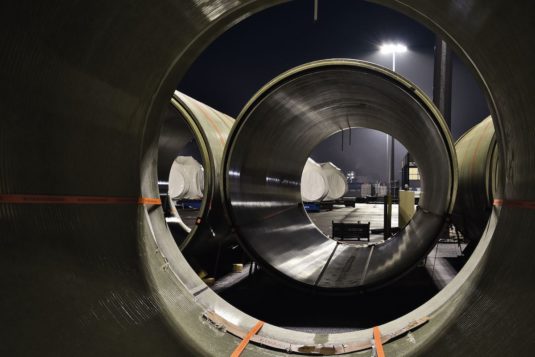The President of the Port Authority of Bilbao, Ricardo Barkala, will take part this Tuesday, October 6, in the opening of the Spanish-German trade mission to address the issue of “Energy Efficiency and Renewable Energy in the port industry in Spain”. Promoted by the German Ministry of Economy and Energy and organised by the German Chamber of Commerce for Spain, the event will take place online. The President of the Port Authority will outline the latest projects promoted by the Port of Bilbao to become a more energy efficient and sustainable location.
The Port of Bilbao, a role model
One of the pioneering projects undertaken in the Port of Bilbao to reduce energy consumption and the emission of gases generated in the production of electricity has been to replace the exterior lighting of the entire port with LED technology. This initiative has been combined with the use of a platform that enables the lighting to be regulated in real time. All this has led to a 14% reduction in power consumption.
Other projects currently underway include the replacement of conventional boilers with heat pumps, which also reduce CO₂ emissions; the acquisition of vehicles powered by alternative energies (100% electric, hybrids and LPG); and the roll-out of a Strategic Energy Plan that addresses current and future energy needs and establishes a decarbonisation roadmap for 2030 and 2050, based on the analysis of the potential for renewables and the change in the energy framework in a first phase. Likewise, the electricity supplier will certify that, through guarantees of origin, 100% of the electricity consumed in the port is from renewable sources, such as wind power, with the consequent reduction to zero of its indirect emissions of greenhouse gases from power consumption.
Additionally, the Port of Bilbao has an energy hub located in the industrial area, where renewable energies have been promoted, and where wind power is concentrated. Public-private collaboration has enabled the development of strategic projects in this area, to accommodate companies in the field of wind power components such as Haizea Wind, which manufactures offshore wind turbine towers, and an international distribution centre for Siemens-Gamesa.
Likewise, Petronor, a subsidiary of the Repsol group, has just been awarded a plot of land in this area to build one of the world’s largest plants for the production of synthetic fuels from green hydrogen, generated with renewable energy.

The Port of Bilbao also promotes other initiatives to contribute to Agenda 2030, one of which is to promote the supply of LNG to ships. The port is at the forefront of Spanish maritime gas traffic, thanks to its LNG regasification plant, Bahía de Bizkaia Gas (BBG), which provides 27.5% of Spain’s total LNG. Other initiatives to be taken into account include, in 2018, the first ship-to-ship LNG bunkering pilot in the Atlantic Arc and the Mediterranean, and the fact that Repsol is building its first LNG filling station in the port to supply gas to ships.
About the German-Spanish trade mission
The German-Spanish online trade mission on energy efficiency in the port industry will start with a conference on 6 October, but will also include B2B online talks on 7 and 8 October. The aim is to organise meetings between German companies and their potential Spanish business partners, as well as potential customers.This initiative targets suppliers of energy efficiency and renewable energy solutions. Applications in the port are numerous: energy savings through energy recovery, efficient outdoor lighting, possible locations for wind and small wind turbines, wave power plants and solar energy, especially with the electricity model of self-consumption and the use of storage technologies. Combined heat and power generation and the internal use of residual heat can also help to avoid CO₂ emissions in industrial companies in the port area.
The program and free registration is available at https://www2.ahk.es/event

 Port access
Port access